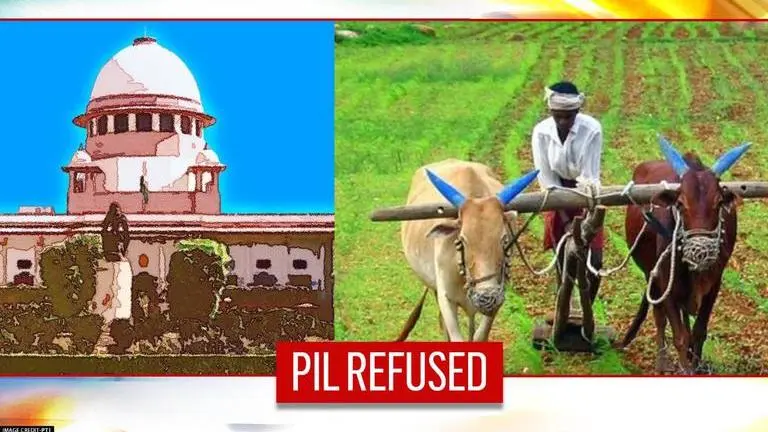Updated 27 October 2020 at 17:51 IST
SC refuses to entertain plea seeking directions to states over implementation of Farm Laws
The Supreme Court on Tuesday refused to entertain a PIL asking the apex court to issue directions on the nation-wide implementation of the Farm Laws.
- India News
- 3 min read

Amid the row over the Farm Laws, the Supreme Court on Tuesday refused to entertain a Public Interest Litigation (PIL) asking the apex court to issue directions on the nation-wide implementation of the laws, categorically stating that the court 'refused to interfere' with the matter. "We refuse to interfere with the petition. Sorry," said the bench headed by Chief Justice of India (CJI) Sharad Arvind Bobde.
The plea, filed by the Hindu Dharma Parishad sought directions to all states to implement the Farmers' Produce Trade and Commerce (Promotion and Facilitation) Act, 2020, the Farmers (Empowerment and Protection) Agreement on Price Assurance and Farm Services Act, 2020, and the Essential Commodities (Amendment) Act, 2020 which have been a cause of contention between the Centre and the Opposition parties.
The opposition has raised concerns over the exploitation of farmers by big corporates and the applicability of the MSP, organising country-wide protests against the Farm Laws since they were passed by the Parliament. Several states are even planning on passing bills against the implementation of the three Farm Laws, with Punjab being the first state to have unanimously cleared three bills to negate the impact of the agrarian laws.
In the midst of this, the petition had demanded that directions be imposed by the top court to order all states to implement the central government's Farm Laws. The court, however, has refused to entertain the plea.
Advertisement
Advertisement
What are the Farm Laws?
The Farm bills, which were passed by the Parliament, came into effect from September 27 after receiving President Ram Nath Kovind's assent. The three laws are - Farmers Produce Trade and Commerce (Promotion and Facilitation) Act, 2020, The Farmers (Empowerment and Protection) Agreement on Price Assurance and Farm Service Act, 2020 and The Essential Commodities (Amendment) Act, 2020.
The Farmers' Produce Trade and Commerce (Promotion and Facilitation) Act, 2020 aims at freeing the farmers from the constraints of the state Agriculture Produce Market Committees whereby they would be able to sell their produce anywhere. On the other hand, The Farmers (Empowerment and Protection) Agreement of Price Assurance and Farm Services Act, 2020 protects and empowers farmers to engage with processors, wholesalers, large retailers, exporters for farm services. This entails the provision of contract farming.
On the other hand, The Essential Commodities (Amendment) Act, 2020 specifies that the supply of foodstuffs including cereals, pulses, potato, edible oilseeds, and oils shall be regulated only under exceptional circumstances.
Published By : Ananya Varma
Published On: 27 October 2020 at 17:51 IST
